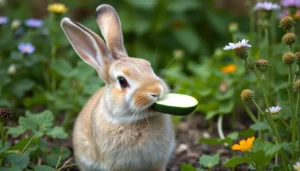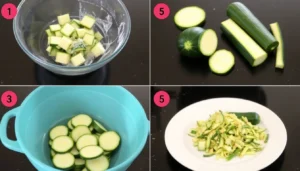As a rabbit owner, you want to provide your furry friend with healthy, safe, and nutritious treats. One question that often arises is, “Can rabbits eat zucchini?” This versatile vegetable is a common staple in human diets, but it’s essential to understand whether it’s suitable for your rabbit. This comprehensive guide’ll explore the pros and cons of feeding zucchini to rabbits. You’ll learn about its nutritional benefits, potential risks, and how to include it in your rabbit’s diet safely.
Nutritional Value of Zucchini for Rabbits
Zucchini, also known as courgette, belongs to the squash family and contains a range of nutrients that can be beneficial to rabbits when fed in moderation. Here’s what zucchini offers:
- Vitamins and Minerals: Zucchini is rich in essential vitamins such as vitamin C and vitamin A. Vitamin C helps boost the immune system, while vitamin A supports healthy skin and eyesight. It also contains vitamin K, which is crucial for proper blood clotting, and B vitamins that contribute to overall energy levels.
- Potassium: This mineral is vital for maintaining proper muscle and nerve function in rabbits. It helps regulate the heartbeat and aids in muscle contractions.
- Manganese: Manganese plays a role in supporting bone health and ensuring the proper functioning of metabolic processes in your rabbit’s body.
These nutrients help to promote overall well-being, making zucchini a nutritious snack option. However, it’s essential to note that zucchini should not replace your rabbit’s primary food source, which is hay.
Fiber Content
One of the key advantages of zucchini for rabbits is its fiber content. Fiber is a vital part of your rabbit’s diet because it supports their digestive system and keeps their gut healthy. The fiber in zucchini promotes regular bowel movements, aids in digestion, and helps prevent digestive issues such as constipation or gastrointestinal stasis (GI stasis), which can be dangerous for rabbits.

The fiber in zucchini also supports the growth of healthy gut bacteria, which is essential for digestion. Additionally, it helps maintain stable blood sugar levels, which is important for your rabbit’s overall health.
Water Content
Zucchini has a high water content, which can help keep your rabbit hydrated, especially during warm weather. Since rabbits are prone to dehydration, offering them foods with high water content, like zucchini, can support kidney function and help regulate body temperature.
The water content in zucchini also aids in the transport of nutrients throughout your rabbit’s body and helps maintain healthy hydration levels. While zucchini can provide a small boost of hydration, it should not replace fresh water in your rabbit’s daily diet.
Benefits of Feeding Zucchini to Rabbits
Feeding zucchini to rabbits in moderation offers several advantages:
- Hydration: As mentioned earlier, zucchini’s high water content can be especially beneficial during the hot months, helping your rabbit stay hydrated. Proper hydration supports kidney function and helps regulate your rabbit’s body temperature, which is essential for their well-being.
- Digestive Health: The dietary fiber in zucchini supports healthy digestion. Fiber is crucial for maintaining a healthy gut and preventing issues like GI stasis. By including zucchini in your rabbit’s diet, you provide additional fiber that complements their primary diet of hay, promoting smooth digestion and preventing bloating or constipation.
- Nutrient Variety: While hay should make up the bulk of your rabbit’s diet, offering vegetables like zucchini adds variety to their nutrient intake. Zucchini provides a range of vitamins and minerals, including potassium and vitamin A, both of which contribute to your rabbit’s overall health and vitality. This variety helps ensure that your rabbit gets a broader spectrum of nutrients, which is important for maintaining a balanced diet.
You can also give them pumpkins, fennel, and pineapples.
Potential Risks and Precautions
Although zucchini is safe for rabbits, there are some risks to keep in mind when feeding it to your pet:
Overfeeding Concerns
While zucchini is nutritious, it should only be fed as a treat. Overfeeding zucchini can lead to digestive issues, as rabbits rely on a diet primarily consisting of hay. Offering too much zucchini can disrupt your rabbit’s digestive system, causing issues like diarrhea or an upset stomach.
To avoid overfeeding:
- Start with small amounts and observe your rabbit’s reaction.
- Gradually increase the serving size if your rabbit tolerates zucchini well.
- Always maintain a balanced diet with hay as the primary food source, along with small portions of fresh vegetables and pellets.

Pesticide Exposure
Commercially grown zucchini may contain pesticide residues, which can be harmful to rabbits. To reduce the risk of pesticide exposure, follow these steps:
- Wash the zucchini thoroughly before feeding it to your rabbit.
- Whenever possible, choose organic zucchini.
- Consider growing your zucchini without using pesticides, ensuring it’s safe for your rabbit to consume.
By taking these precautions, you can help minimize your rabbit’s exposure to harmful chemicals.
Digestive Sensitivity
Introducing any new food to your rabbit’s diet can lead to digestive upset, and zucchini is no exception. Rabbits have sensitive digestive systems, and some may not tolerate zucchini well. It’s essential to introduce zucchini gradually and monitor your rabbit for any signs of discomfort, such as:
- Soft stools or diarrhea
- Lethargy or loss of appetite
- Bloating or discomfort
If your rabbit shows any of these signs after eating zucchini, stop feeding it and consult your veterinarian for advice.
It’s also worth noting that while the flesh and skin of zucchini are safe for rabbits, the leaves and stems may not be suitable for consumption. Focus on feeding the edible parts of the zucchini and avoid giving your rabbit the stems or leaves.
How to Safely Feed Zucchini to Rabbits
To safely introduce zucchini into your rabbit’s diet, follow these guidelines:
- Start Slowly: Introduce zucchini in small portions to see how your rabbit reacts. This will help you avoid digestive issues.
- Observe: Monitor your rabbit for any signs of digestive upset. If your rabbit seems fine after eating zucchini, you can gradually increase the amount.
- Wash Thoroughly: Always wash the zucchini thoroughly to remove any dirt or pesticide residue.
- Balance: Remember that zucchini is a treat and should not replace the main components of your rabbit’s diet. Hay should remain the primary food source, with fresh vegetables like zucchini added in moderation.
- Variety: Offer a range of vegetables to ensure your rabbit gets a variety of nutrients. Feeding too much of one vegetable can lead to nutritional imbalances.
Conclusion: Can Rabbits Eat Zucchini?
Zucchini can be a healthy and refreshing addition to your rabbit’s diet when fed in moderation. It provides essential vitamins, minerals, fiber, and hydration, all of which contribute to your rabbit’s overall health. However, it’s important to introduce zucchini gradually, monitor for any digestive issues, and always ensure that hay remains the main component of your rabbit’s diet.
By following these guidelines, you can safely offer zucchini as a treat that enhances your rabbit’s nutrition and well-being. As always, consult your veterinarian before making significant changes to your rabbit’s diet to ensure you’re meeting their specific dietary needs.
With careful introduction and moderation, zucchini can be a tasty and nutritious snack for your rabbit, helping to keep them healthy and happy!

